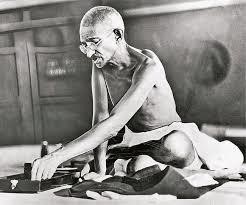
October 2nd, every year, is observed as Gandhi Jayanti, to mark the birth anniversary of prominent freedom fighter, Mohandas Karamchand Gandhi, popularly known as Mahatma Gandhi. Known as Father of Nation, it was Mahatma Gandhi who gave the principle of non-violence which was the basis of freedom struggle. It was him and his values and ideologies that pioneered India’s struggle to achieve independence.
This year will mark the 152nd birth anniversary of Mahatma Gandhi and will be observed by entire world as Gandhi Jayanti and by United Nations as ‘International Day of Non-violence’. It is marked as National Holiday to remember one of the greatest freedom fighters of India.
Mahatma Gandhi was born on October 2,1869, in Porbandar, Gujarat. Raised in Hindu family, he completed his education in Law from Inner temple,London. After undergoing two unsuccessful years in India, he went to South Africa to represent an Indian merchant in a Lawsuit. It was in South Africa, where he started raising voice over injustices being carried out. He started organising peasants, farmers and labourers to raise voice against atrocities happening with them. He carried out his first non-violence movement in South Africa, while campaigning for civil rights and opposing Apartheid. He returned to India in 1915 and conducted his frist ‘Satyagraha’- ‘Holding onto Truth’. After his first Satyagraha in Champaran, Bihar, there was no looking back for him and his ideologies. He was the man behind Non-Cooperation movement of 1920, which was organised to demand ‘Purna Swaraj’ for India from the British government. He also shepherded the CivilDisobedience movement in March 1930, which started with the famous Dandi March, in which he along with his 78 supporters marched from Sabarmati Ashram to Dandi, where he broke the salt law by extracting salt from salt water. In 1942, he launched Quit India Movement where he made the famous, ‘Do or Die’ call. The movement was successful in compelling the British government to leave India and in granting the country and countrymen,’Purna Swaraj’, to attain which,thousands of people sacrificed their lives.
Gandhi Jayanthi is observed to pay respect and tribute to the legendary freedom fighter, who gave his all to help the country and countrymen gain and taste freedom. He inspired everyone to come forward and raise their voices against atrocities happening with them. He was the firm opposer of injustices of all kinds and a firm supporter of ‘Ahimsa’, ‘Simplicity’ and importance of ‘Truth’ in one’s life and propagated the same during his entire life. On Gandhi Jayanthi, people remember their pathfinder, his principles and pay their respect to him. Lots of activities are organised to throw light on his life and to inspire the upcoming generation to follow his ideals. Several initiatives, for the development of country, society and people, are taken on this day, as a way of following his teachings. On Saturday, October 2, 2021, the nation will pay homage to Mahatma Gandhi on what will be the 152nd birth anniversary of the “Father of the Nation.”
Gandhi Jeyanthi, as the occasion is known, coincides this year with the Azadi Ka Amrit Mahotsav, which was inaugurated on March 12 by Prime Minister Narendra Modi, on the 91st anniversary of a significant event in Gandhi's life, the Dandi March.
The Azadi Ka Amrit Mahotsav will be celebrated till August 15, 2023, the 77th Independence Day. Mohandas Karamchand Gandhi, who shares his birthday with another legendary personality, former PM Lal Bahadur Shastri (born 1904), was born on October 2, 1869, in Porbandar, in present-day Gujarat. A lawyer whose life changed through his experiences in South Africa, Gandhi played the most significant role in India's independence movement, holding demonstrations through non-violent means. Though it is commonly believed that the title “Mahatma” was bestowed upon Gandhi by India's first Nobel laureate, “Gurudev” Rabindranath Tagore, the Gujarat government has disputed this, claiming instead that this title was given by a local journalist from Saurashtra. However, the leader is also commonly referred to as “Bapu” (father).
Gandhi is the most frequently invoked Indian personality by world leaders, most of whom, during a visit to India, visit his resting place in Delhi. US president Joe Biden quoted the freedom fighter during his meeting with PM Modi at the White House last week.

Internationally, October 2 is observed as the Day of Nonviolence in remembrance of the “Mahatma.” In India, it is a full holiday, and one of three national festivals, along with Republic Day (January 26) and Independence Day (August 15). On June 15, 2007, the UN General Assembly adopted a resolution that declared October 2 as International Day of Non-Violence. The resolution reaffirms “the universal relevance of the principle of non-violence” and the desire “to secure a culture of peace, tolerance, understanding and non-violence”.
Author
Danisha.R ( II MBA)
2021-10-02